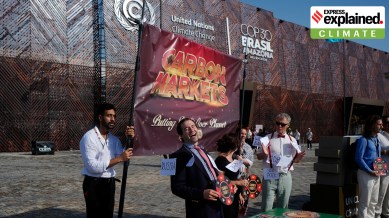US in fight against climate change: Never a leader, but still significant
As the world’s largest historical emitter of greenhouse gases, and also the country with great financial, scientific and technological capability, the United States has both the responsibility and the capability to take the lead in the fight against climate change.

For a country whose leadership has pulled out of the Paris Agreement and turned climate-sceptic under President Donald Trump, it is perhaps no surprise that the United States has almost no presence at the COP30 climate conference in Belem, Brazil.
As the world’s largest historical emitter of greenhouse gases, and also the country with great financial, scientific and technological capability, the United States has both the responsibility and the capability to take the lead in the fight against climate change. But under Trump, for the first time, the US seems to have decided to do a no-show at COP30. The provisional list of country delegates released by the organisers, and published by UK publication Carbon Brief, has no names from the US.
Ironically, from the COP30 perspective, this might not be entirely bad. A reduced involvement or complete absence would mean smaller prospects of the US trying to retard the progress being made. This is a real apprehension — the Trump administration earlier this year undercut international efforts to regulate emissions from the shipping industry.
US out of Paris Agreement, not UNFCCC
This annual two-week event is a conference of the parties (COP) to the UN Framework Convention on Climate Change (UNFCCC), the 1994 mother agreement which, as the name suggests, lays down the broad principles for global action on climate change. Discussions at COP yielded two operational agreements, the Kyoto Protocol in 1997 and the Paris Agreement in 2015, which serve as the implementing instruments.
The COP events also serve as the platform to hold a meeting of the parties to the Kyoto Protocol and that to the Paris Agreement.
The United States has pulled out of the Paris Agreement but is still a party to the UNFCCC. It never ratified the Kyoto Protocol and thus did not become a party to that. In Belem, the US could have participated in the proceedings of UNFCCC but not the Paris Agreement.
Never a climate leader
What is at times glossed over is that while Trump is a climate change denier, the US under any other President was never very proactive on climate action. In fact, it is one of the biggest laggards.
Between 1990, the original base year mentioned in the UNFCCC, and 2023, US annual emissions fell by just 4 per cent. In 2023, much was made of the promise under Joe Biden that the US would reduce its emissions by 50-52 per cent by 2030 from 2005 levels. But even that was a minimal contribution, considering that the Intergovernmental Panel on Climate Change had said that global emissions needed to drop by at least 43 per cent on 2019 levels by 2030. The US promised reduction of 50-52 per cent on 2005 levels translated to just about 45-46 per cent from 2019 levels.
The US record on providing finance and technology has been equally modest, despite the fact that it is home to some of the biggest and richest companies and the most advanced technologies. The annual target of US$ 100 billion from 2020 onwards, to be raised by the developed countries together, could not be met for several years. And the amounts that were claimed to have been delivered were hotly contested by developing countries and independent agencies.
After being voted out, the Biden administration said that it had significantly scaled up the level of climate finance being made available for the developing countries, from about US$ 1.5 billion in 2021 to US$ 9.5 billion in 2023. It also claimed that in fiscal year 2024, it had delivered US$ 11 billion. But by this time, the combined ask from the developed countries as a group had reached hundreds of billions of dollars.
US withdrawal still a setback
Notwithstanding its below-par contributions, America’s complete withdrawal from the global climate system would still hurt the cause of climate change.
The United States still accounts for over 11 per cent of annual global emissions. There is no way the world can achieve its emission reduction targets without a significant US contribution.
A bigger impact is likely to be on climate finance flows. The United States still has unparalleled influence over channelisation of global finance. It controls global financial institutions and multilateral agencies, while also housing some of the biggest corporates. A less-than-enthusiastic US could result in a situation where additional financial resources would be even more difficult to mobilise.
Another area likely to be greatly impacted is climate research and science. The Trump administration has been cutting down on funds and manpower in some crucial institutions engaged in climate research, like the National Oceanic and Atmospheric Administration (NOAA) and the Environment Protection Agency (EPA), which could have long-term repercussions for science and data related to climate.
Incidentally, several governors and city administration officials from the US are participating in COP30 meetings in Belem. Many corporate leaders from companies based in the US are also present, showing that Trump policies on climate do not have universal support in his country.